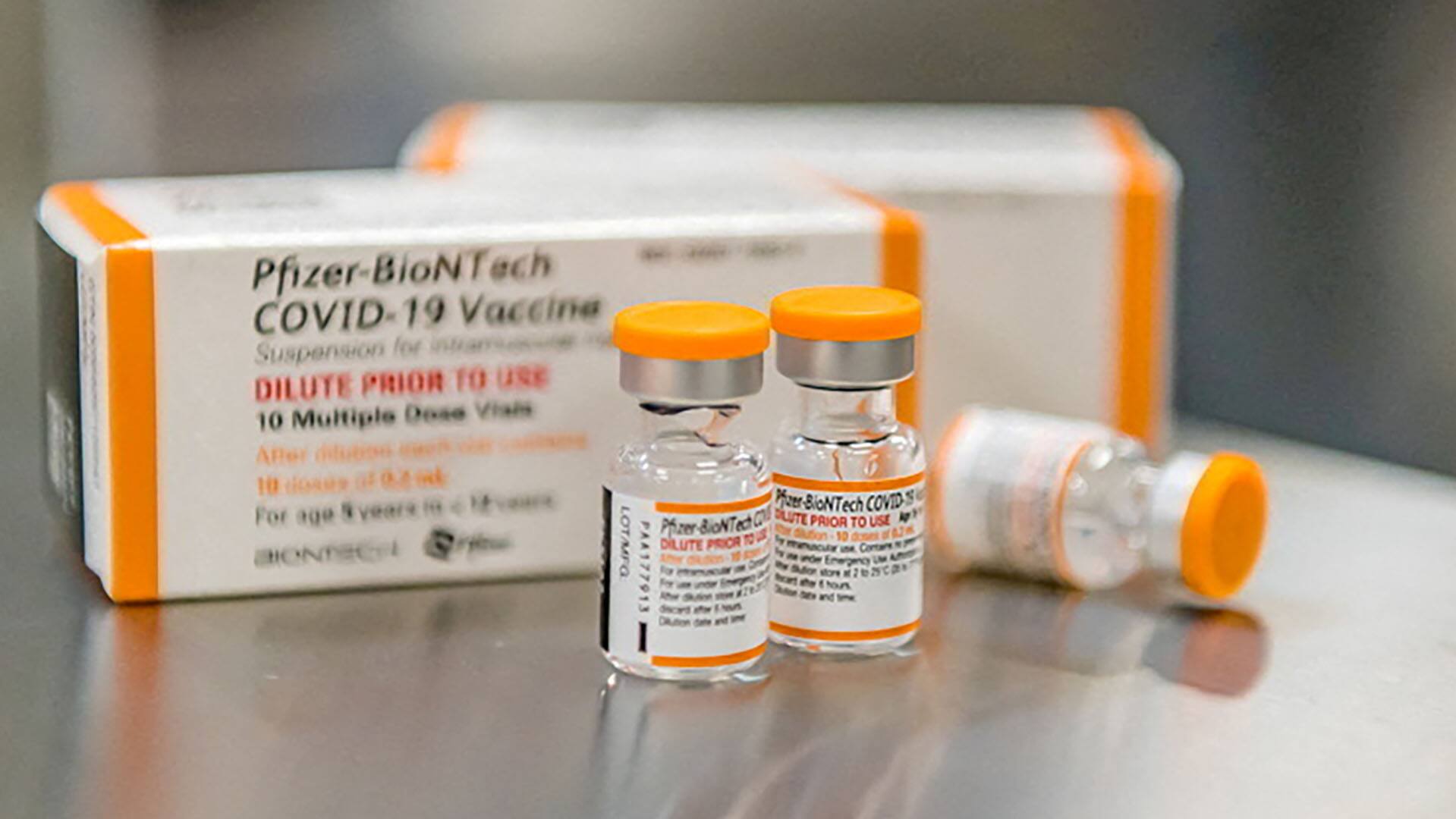The latest:
The director of the World Health Organization's Europe office said Thursday the continent is now entering a "plausible endgame" to the pandemic and that the number of coronavirus deaths is starting to plateau.
Dr. Hans Kluge said at a media briefing that there is a "singular opportunity" for countries across Europe to take control of COVID-19 transmission due to three factors: high levels of immunization due to vaccination and natural infection; the virus's tendency to spread less in warmer weather; and the lower severity of the Omicron variant.
"This period of higher protection should be seen as a ceasefire that could bring us enduring peace," he said.
As the winter subsides in much of Europe in the coming weeks, when the virus's transmission naturally drops, Kluge said the upcoming spring "leaves us with the possibility for a long period of tranquility and a much higher level of population defence against any resurgence in transmission."
Even if another variant emerges, Kluge said, health authorities in Europe should be able to keep it in check, provided immunization and boosting efforts continue, along with other public health interventions.
He said, however, this demands "a drastic and uncompromising increase in vaccine-sharing across borders," saying vaccines must be provided to everyone across Europe and beyond. Scientists have repeatedly warned that unless the majority of the world's population is vaccinated, any opportunities for COVID-19 to keep spreading means it could mutate into deadlier and more transmissible forms.
Numerous countries across Europe, including parts of Britain and Denmark, have dropped nearly all their coronavirus restrictions after saying that Omicron has peaked. Others, including Spain, are now considering whether to consider COVID-19 to be an endemic problem that might be handled more like seasonal flu.
Italy will soon announce a timetable to roll back its COVID-19 curbs, Prime Minister Mario Draghi said Wednesday, as a surge in cases fuelled by the Omicron variant started to slow.
At WHO's Geneva headquarters, director-general Tedros Adhanom Ghebreyesus warned this week that the world as a whole is still far from exiting the pandemic.
"We are concerned that a narrative has taken hold in some countries that because of vaccines — and because of Omicron's high transmissibility and lower severity — preventing transmission is no longer possible and no longer necessary," Tedros said Tuesday. "Nothing could be further from the truth."
The agency has said even countries with high levels of vaccination should not succumb to political pressure and release all of their coronavirus measures at once.
Kluge noted that there were 12 million new coronavirus cases across WHO's European region last week — the highest single weekly total during the pandemic. He said that spike was driven by the hugely infectious Omicron variant, but admissions to hospital intensive care units haven't risen significantly.
-From The Associated Press and Reuters, last updated at 7:15 a.m. ET
What's happening across Canada

With lab-based testing capacity deeply strained and increasingly restricted, experts say true case counts are likely far higher than reported. Hospitalization data at the regional level is also evolving, with several provinces saying they will report figures that separate the number of people in hospital because of COVID-19 from those in hospital for another medical issue who also test positive for COVID-19.
For more information on what is happening in your community — including details on outbreaks, testing capacity and local restrictions — click through to the regional coverage below.
You can also read more from the Public Health Agency of Canada, which provides a detailed look at every region — including seven-day average test positivity rates — in its daily epidemiological updates.
In Atlantic Canada, the total number of COVID-19 hospitalizations in New Brunswick stood at 165, health officials said Wednesday — a fresh high in the province. Of those, 16 people were in intensive care units, the provincial COVID-19 dashboard showed. The province also reported four additional COVID-related deaths and 381 additional lab-confirmed cases.
In Nova Scotia, some hospitals were facing serious strain on capacity amid pandemic pressures, a health official said. The province, which provides some detail on different types of COVID admissions in its daily releases, said Wednesday that 92 people who were admitted because of COVID-19 were receiving specialized care in a dedicated unit, including 13 people in ICU. An additional 255 people were in hospital with COVID-19, health officials said, including people who were admitted for another reason but tested positive on arrival and those who contracted COVID-19 after being admitted. The province also reported six additional deaths and 395 lab-confirmed cases.
Prince Edward Island health officials said Wednesday that 15 people were in hospital due to COVID-19, including two people in the province's ICU. "There are eight other people in hospital who were admitted for other reasons and were COVID positive on admission or tested positive after being admitted," a statement from the province said. Health officials also reported 238 additional lab-confirmed cases.
In Newfoundland and Labrador, health officials said 20 people were in hospital with COVID-19, including nine people in critical care. The province also reported four additional deaths and 248 lab-confirmed cases.
In Central Canada, Ontario's top doctor is set to hold a news conference on the pandemic later Thursday, his first since public health restrictions began to ease this week. Dr. Kieran Moore's afternoon briefing comes after modelling from the province's expert pandemic advisers predicted COVID-19 cases would rise after Monday's partial reopening.
The Ontario COVID-19 Science Advisory Table said relaxing public health measures aimed at controlling the Omicron variant would increase virus spread, but the experts couldn't say by how much. The group said outcomes will depend partly on how many people have recently been infected, a number that is hard to determine because the province has limited access to PCR tests.
The province's COVID-19 dashboard showed 2,939 hospitalizations on Wednesday — down by 152 from a day earlier — with 555 people in ICU due to the virus. The province also reported 72 additional deaths and 3,909 lab-confirmed cases.
Quebec, meanwhile, reported 2,730 hospitalizations — down by 122 from a day earlier — with 204 people in intensive care. The province also reported 50 additional deaths and 3,816 lab-confirmed cases.
In the Prairie provinces, Manitoba on Wednesday reported a total of 744 COVID-19 hospitalizations — up by seven from a day earlier — with 54 people in ICUs. The province also reported seven additional deaths and 526 additional lab-confirmed cases.
Manitoba's chief public health officer said that data shows the province may have passed the peak of the Omicron-fuelled surge and restrictions on gathering sizes and people allowed at sports events will be relaxed beginning on Tuesday.
"The next few weeks will be critical as we monitor these trends and determine if it is appropriate to reduce additional restrictions over the longer term," Dr. Brent Roussin said.
Saskatchewan on Wednesday reported a pandemic high of 372 hospitalizations on its COVID-19 dashboard — up by two from a day earlier — with 40 in ICUs. The province also reported four additional deaths and 611 lab-confirmed cases.
Health officials in Alberta on Wednesday reported a total of 1,598 COVID-19 hospitalizations — up by 13 from a day earlier — with 106 people in the province's ICUs. The province also reported 14 additional deaths and 3,024 lab-confirmed cases.
Across the North, the public health state of emergency in Nunavut expires Thursday. The territory on Wednesday reported 22 additional cases of COVID-19. Yukon saw 18 additional cases, while the Northwest Territories reported 148 new cases.
In British Columbia, the province reported 988 COVID-19 hospitalizations — down by 47 from a day earlier — with 136 people in the province's ICUs. Health officials also reported 18 additional deaths and 1,776 lab-confirmed cases.
-From CBC News and The Canadian Press, last updated at 7:15 a.m. ET
What's happening around the world

As of early Thursday morning, roughly 385.1 million cases of COVID-19 had been reported around the world, according to Johns Hopkins University's coronavirus tracker. The reported global death toll stood at more than 5.7 million.
In the Asia-Pacific region, a total of 55 new COVID-19 infections were found among Olympics-related personnel on Feb. 2, the chair of the Beijing 2022 medical expert panel said on Thursday — the highest daily tally so far.
New Zealand on Thursday announced a phased reopening of its border that has been largely closed for two years due to the COVID-19 pandemic, but travel bodies said self-isolation rules need to be removed to revive the struggling tourism sector.
In the Americas, COVID-19 infections and deaths are still increasing, but the rise in infections seems to be slowing in places hit earliest by the Omicron variant, the Pan American Health Organization said.
Mexico, for example, topped five million total confirmed coronavirus cases on Wednesday, registering 42,181 new cases and 573 new deaths, according to health ministry data.
Africa has not reached an endemic phase of the COVID-19 pandemic, the director of the Africa Centres for Disease Control and Prevention said Thursday.
Meanwhile, health officials in South Africa on Wednesday reported 4,502 additional cases of COVID-19 and 175 deaths.
In the Middle East, Saudi Arabia said Thursday that citizens will be required to take the COVID-19 booster shot to be able to travel abroad starting Feb. 9, state media reported. The kingdom is also requiring visitors to present a negative PCR result before entry.
Iran on Wednesday reported 59 additional deaths from COVID-19 in the past 24 hours, with 38,160 additional cases reported.
-From Reuters, CBC News and The Associated Press, last updated at 7:55 a.m. ET

















